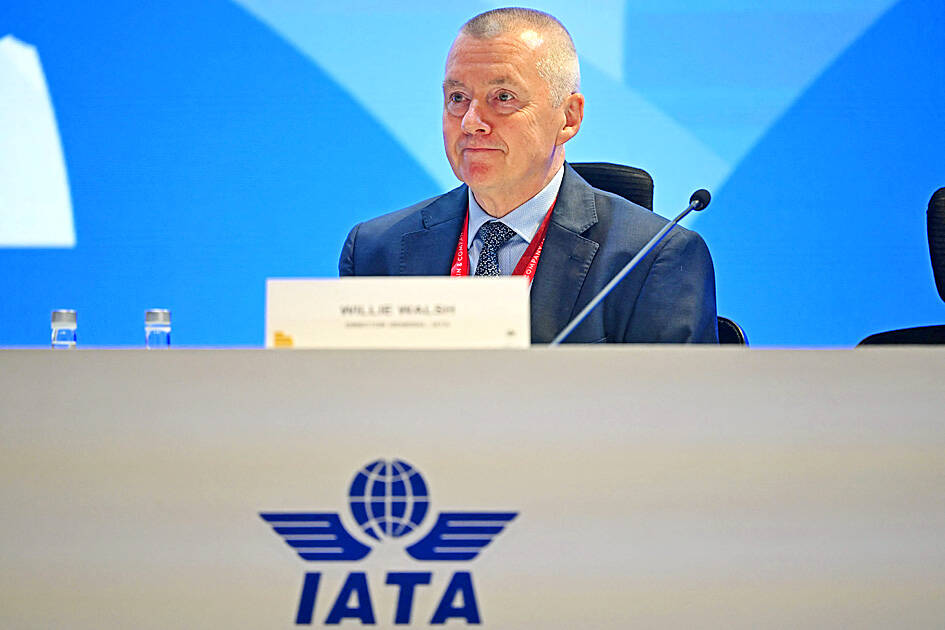Airlines on Monday revised down their traffic and profit forecasts for this year, citing “headwinds” for the global economy, with industry chiefs warning of the risk of increased tariffs impacting the sector.
The International Air Transport Association (IATA) estimates fewer than 5 billion air journeys would take place this year, compared with the previously forecast 5.22 billion.
“The first half of 2025 has brought significant uncertainties to global markets,” IATA director-general Willie Walsh told its annual general meeting in New Delhi.

Photo: AFP
However, “considering the headwinds, it’s a strong result that demonstrates the resilience that airlines have worked hard to fortify,” he added.
Cumulative airline profits would reach US$36 billion this year, US$600 million less than expected, the IATA said.
Commercial aviation revenues are expected to remain below the US$1 trillion forecast in December last year, with the IATA now reporting US$979 billion.
Walsh, addressing IATA delegates, called for the aviation sector to be spared from increased tariffs, although he did not name US President Donald Trump, who unveiled sweeping duties on trading partners in April.
While looking at profits, Walsh warned that “perspective is critical” to put industry-wide figures into context, saying that per passenger, it was still a narrow margin.
“It’s still a thin buffer and any new tax, increase in airport or navigation charge, demand shock or costly regulation will quickly put the industry’s resilience to the test,” he said.
“Policymakers who rely on airlines as the core of a value chain that employs 86.5 million people and supports 3.9 percent of global economic activity must keep this clearly in focus,” he added.
The IATA also expects 69 million tonnes of cargo to be transported by air this year, down from the 72.5 million tonnes previously expected.
A barrel of Brent North Sea crude, the international oil benchmark, stands below US$65 as a result of Trump’s tariffs, his call to “drill baby drill” and especially a decision by the OPEC+ members to hike crude output quotas.
This represents an immediate boon for airlines. Jet fuel is expected to average US$86 a barrel this year, well below the US$99 average last year, “accounting for 25.8 percent of all operating costs,” the IATA said.
The total fuel bill of US$236 billion for this year is US$25 billion lower than last year.
Among the “risks” weighing on commercial aviation, the IATA identified conflicts such as the war in Ukraine, as well as “trade tensions.”
“Tariffs and prolonged trade wars dampen demand for air cargo and potentially travel,” the IATA said.
“Additionally, the uncertainty over how the Trump administration’s trade policies will evolve could hold back critical business decisions that drive economic activity, and with it the demand for air cargo and business travel,” it added.

In Italy’s storied gold-making hubs, jewelers are reworking their designs to trim gold content as they race to blunt the effect of record prices and appeal to shoppers watching their budgets. Gold prices hit a record high on Thursday, surging near US$5,600 an ounce, more than double a year ago as geopolitical concerns and jitters over trade pushed investors toward the safe-haven asset. The rally is putting undue pressure on small artisans as they face mounting demands from customers, including international brands, to produce cheaper items, from signature pieces to wedding rings, according to interviews with four independent jewelers in Italy’s main

Japanese Prime Minister Sanae Takaichi has talked up the benefits of a weaker yen in a campaign speech, adopting a tone at odds with her finance ministry, which has refused to rule out any options to counter excessive foreign exchange volatility. Takaichi later softened her stance, saying she did not have a preference for the yen’s direction. “People say the weak yen is bad right now, but for export industries, it’s a major opportunity,” Takaichi said on Saturday at a rally for Liberal Democratic Party candidate Daishiro Yamagiwa in Kanagawa Prefecture ahead of a snap election on Sunday. “Whether it’s selling food or

CONCERNS: Tech companies investing in AI businesses that purchase their products have raised questions among investors that they are artificially propping up demand Nvidia Corp chief executive officer Jensen Huang (黃仁勳) on Saturday said that the company would be participating in OpenAI’s latest funding round, describing it as potentially “the largest investment we’ve ever made.” “We will invest a great deal of money,” Huang told reporters while visiting Taipei. “I believe in OpenAI. The work that they do is incredible. They’re one of the most consequential companies of our time.” Huang did not say exactly how much Nvidia might contribute, but described the investment as “huge.” “Let Sam announce how much he’s going to raise — it’s for him to decide,” Huang said, referring to OpenAI

The global server market is expected to grow 12.8 percent annually this year, with artificial intelligence (AI) servers projected to account for 16.5 percent, driven by continued investment in AI infrastructure by major cloud service providers (CSPs), market researcher TrendForce Corp (集邦科技) said yesterday. Global AI server shipments this year are expected to increase 28 percent year-on-year to more than 2.7 million units, driven by sustained demand from CSPs and government sovereign cloud projects, TrendForce analyst Frank Kung (龔明德) told the Taipei Times. Demand for GPU-based AI servers, including Nvidia Corp’s GB and Vera Rubin rack systems, is expected to remain high,